Making Ethical Decisions: Analysis of the Mr. Martinez Case Study
VerifiedAdded on 2022/08/08
|5
|1236
|46
Case Study
AI Summary
This case study, centered on the Mr. Martinez case, presents an ethical dilemma in healthcare concerning end-of-life decisions. The patient, suffering from respiratory failure and COPD, faces conflicting ethical principles: beneficence (providing life-saving treatment like CPR and ventilator support) versus autonomy (respecting the patient's or family's wishes to withhold such treatment). The paper explores key ethical issues, including the conflict between autonomy and beneficence, and the importance of informed decision-making. It also addresses end-of-life issues, such as passive euthanasia, and how ethical models and best practices guide healthcare practitioners in making legal and ethical decisions. The analysis emphasizes the need for palliative care and adherence to ethical principles and guidelines to ensure the best possible patient outcomes and respect patient and family wishes.
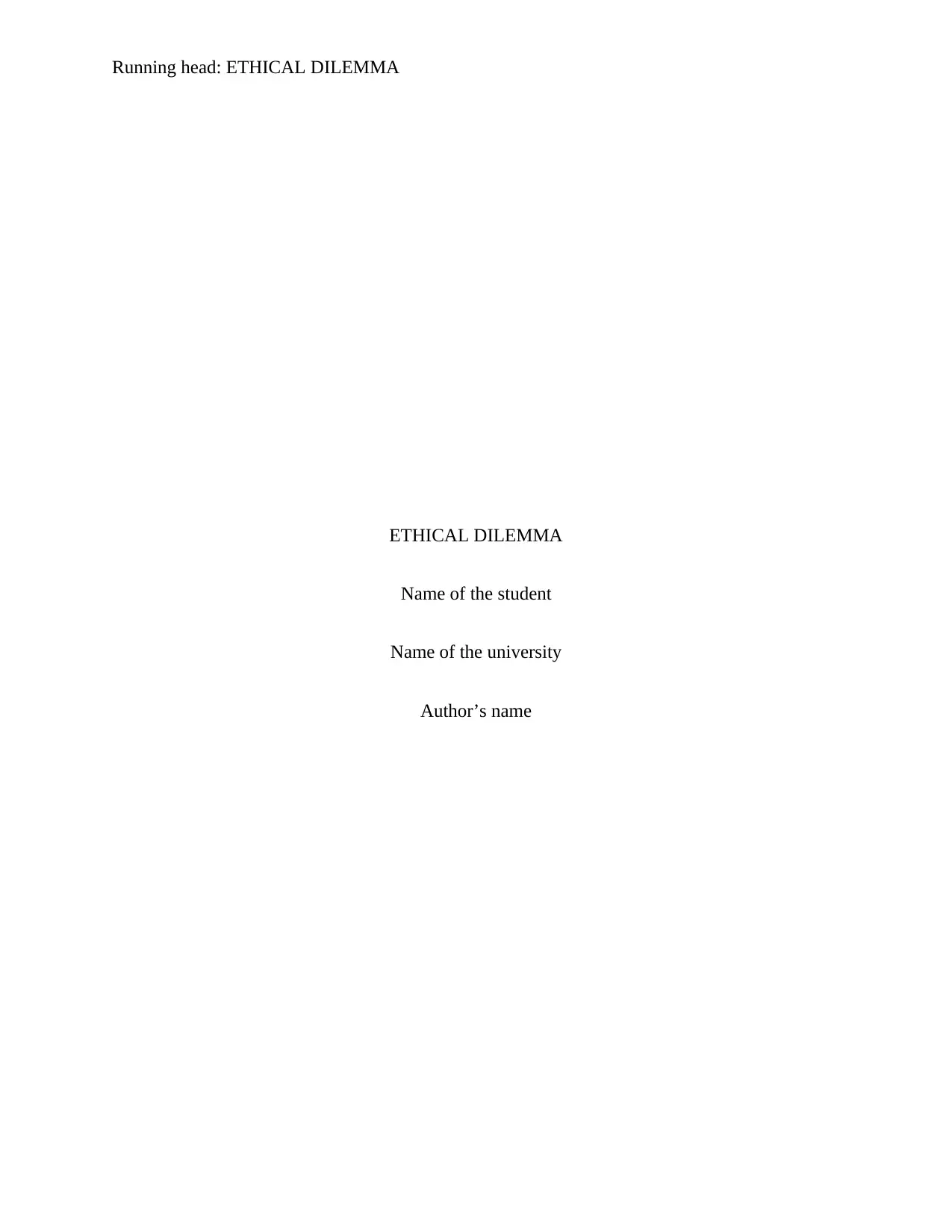
Running head: ETHICAL DILEMMA
ETHICAL DILEMMA
Name of the student
Name of the university
Author’s name
ETHICAL DILEMMA
Name of the student
Name of the university
Author’s name
Paraphrase This Document
Need a fresh take? Get an instant paraphrase of this document with our AI Paraphraser
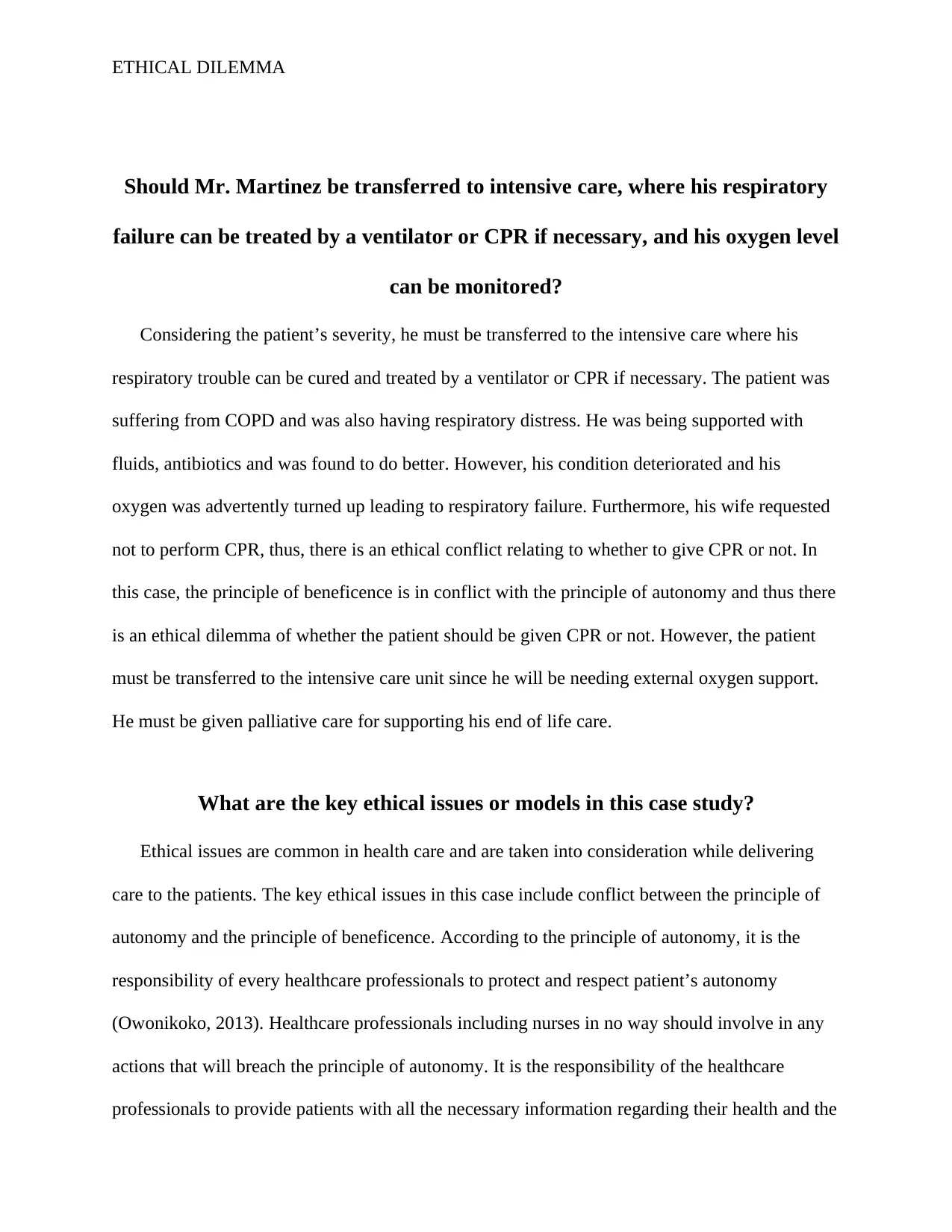
ETHICAL DILEMMA
Should Mr. Martinez be transferred to intensive care, where his respiratory
failure can be treated by a ventilator or CPR if necessary, and his oxygen level
can be monitored?
Considering the patient’s severity, he must be transferred to the intensive care where his
respiratory trouble can be cured and treated by a ventilator or CPR if necessary. The patient was
suffering from COPD and was also having respiratory distress. He was being supported with
fluids, antibiotics and was found to do better. However, his condition deteriorated and his
oxygen was advertently turned up leading to respiratory failure. Furthermore, his wife requested
not to perform CPR, thus, there is an ethical conflict relating to whether to give CPR or not. In
this case, the principle of beneficence is in conflict with the principle of autonomy and thus there
is an ethical dilemma of whether the patient should be given CPR or not. However, the patient
must be transferred to the intensive care unit since he will be needing external oxygen support.
He must be given palliative care for supporting his end of life care.
What are the key ethical issues or models in this case study?
Ethical issues are common in health care and are taken into consideration while delivering
care to the patients. The key ethical issues in this case include conflict between the principle of
autonomy and the principle of beneficence. According to the principle of autonomy, it is the
responsibility of every healthcare professionals to protect and respect patient’s autonomy
(Owonikoko, 2013). Healthcare professionals including nurses in no way should involve in any
actions that will breach the principle of autonomy. It is the responsibility of the healthcare
professionals to provide patients with all the necessary information regarding their health and the
Should Mr. Martinez be transferred to intensive care, where his respiratory
failure can be treated by a ventilator or CPR if necessary, and his oxygen level
can be monitored?
Considering the patient’s severity, he must be transferred to the intensive care where his
respiratory trouble can be cured and treated by a ventilator or CPR if necessary. The patient was
suffering from COPD and was also having respiratory distress. He was being supported with
fluids, antibiotics and was found to do better. However, his condition deteriorated and his
oxygen was advertently turned up leading to respiratory failure. Furthermore, his wife requested
not to perform CPR, thus, there is an ethical conflict relating to whether to give CPR or not. In
this case, the principle of beneficence is in conflict with the principle of autonomy and thus there
is an ethical dilemma of whether the patient should be given CPR or not. However, the patient
must be transferred to the intensive care unit since he will be needing external oxygen support.
He must be given palliative care for supporting his end of life care.
What are the key ethical issues or models in this case study?
Ethical issues are common in health care and are taken into consideration while delivering
care to the patients. The key ethical issues in this case include conflict between the principle of
autonomy and the principle of beneficence. According to the principle of autonomy, it is the
responsibility of every healthcare professionals to protect and respect patient’s autonomy
(Owonikoko, 2013). Healthcare professionals including nurses in no way should involve in any
actions that will breach the principle of autonomy. It is the responsibility of the healthcare
professionals to provide patients with all the necessary information regarding their health and the
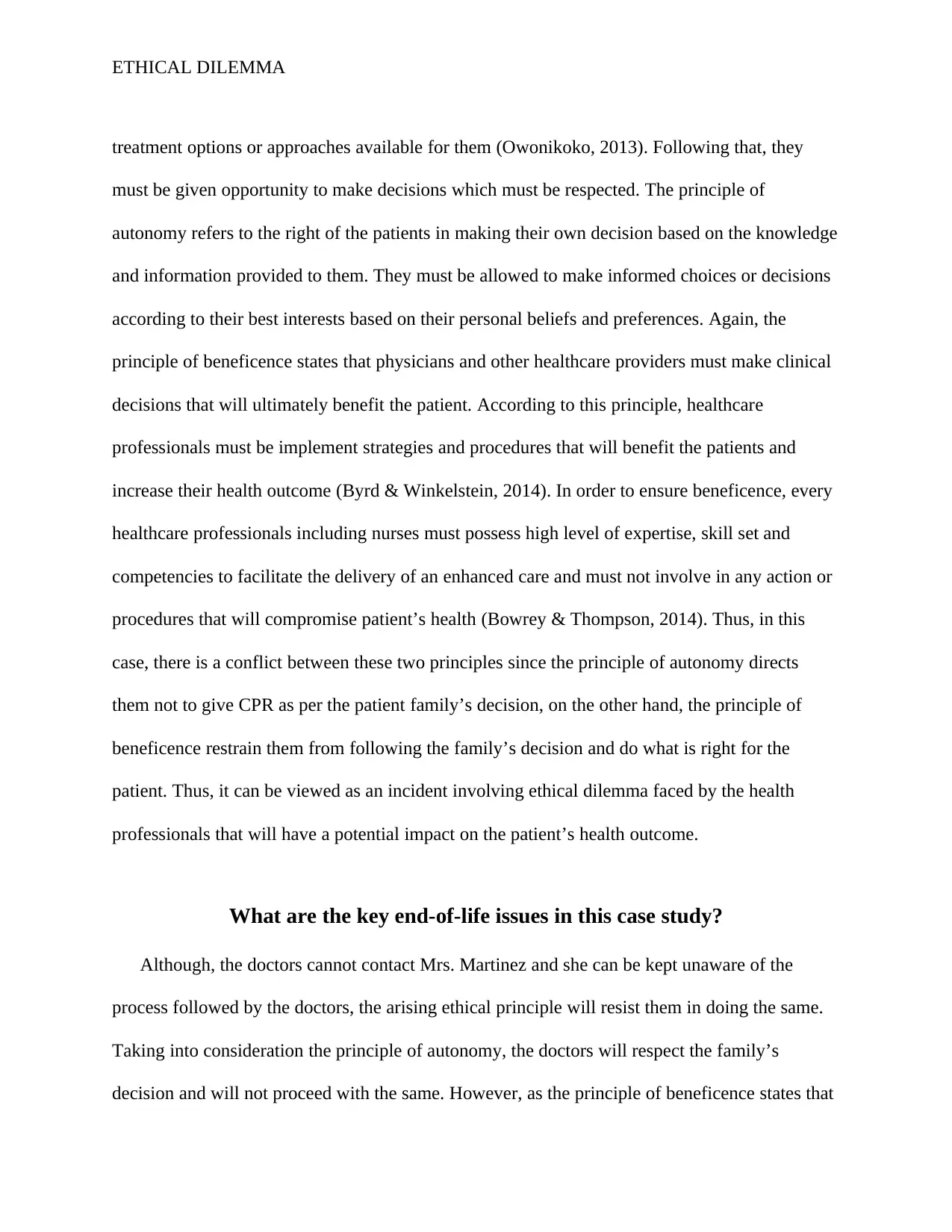
ETHICAL DILEMMA
treatment options or approaches available for them (Owonikoko, 2013). Following that, they
must be given opportunity to make decisions which must be respected. The principle of
autonomy refers to the right of the patients in making their own decision based on the knowledge
and information provided to them. They must be allowed to make informed choices or decisions
according to their best interests based on their personal beliefs and preferences. Again, the
principle of beneficence states that physicians and other healthcare providers must make clinical
decisions that will ultimately benefit the patient. According to this principle, healthcare
professionals must be implement strategies and procedures that will benefit the patients and
increase their health outcome (Byrd & Winkelstein, 2014). In order to ensure beneficence, every
healthcare professionals including nurses must possess high level of expertise, skill set and
competencies to facilitate the delivery of an enhanced care and must not involve in any action or
procedures that will compromise patient’s health (Bowrey & Thompson, 2014). Thus, in this
case, there is a conflict between these two principles since the principle of autonomy directs
them not to give CPR as per the patient family’s decision, on the other hand, the principle of
beneficence restrain them from following the family’s decision and do what is right for the
patient. Thus, it can be viewed as an incident involving ethical dilemma faced by the health
professionals that will have a potential impact on the patient’s health outcome.
What are the key end-of-life issues in this case study?
Although, the doctors cannot contact Mrs. Martinez and she can be kept unaware of the
process followed by the doctors, the arising ethical principle will resist them in doing the same.
Taking into consideration the principle of autonomy, the doctors will respect the family’s
decision and will not proceed with the same. However, as the principle of beneficence states that
treatment options or approaches available for them (Owonikoko, 2013). Following that, they
must be given opportunity to make decisions which must be respected. The principle of
autonomy refers to the right of the patients in making their own decision based on the knowledge
and information provided to them. They must be allowed to make informed choices or decisions
according to their best interests based on their personal beliefs and preferences. Again, the
principle of beneficence states that physicians and other healthcare providers must make clinical
decisions that will ultimately benefit the patient. According to this principle, healthcare
professionals must be implement strategies and procedures that will benefit the patients and
increase their health outcome (Byrd & Winkelstein, 2014). In order to ensure beneficence, every
healthcare professionals including nurses must possess high level of expertise, skill set and
competencies to facilitate the delivery of an enhanced care and must not involve in any action or
procedures that will compromise patient’s health (Bowrey & Thompson, 2014). Thus, in this
case, there is a conflict between these two principles since the principle of autonomy directs
them not to give CPR as per the patient family’s decision, on the other hand, the principle of
beneficence restrain them from following the family’s decision and do what is right for the
patient. Thus, it can be viewed as an incident involving ethical dilemma faced by the health
professionals that will have a potential impact on the patient’s health outcome.
What are the key end-of-life issues in this case study?
Although, the doctors cannot contact Mrs. Martinez and she can be kept unaware of the
process followed by the doctors, the arising ethical principle will resist them in doing the same.
Taking into consideration the principle of autonomy, the doctors will respect the family’s
decision and will not proceed with the same. However, as the principle of beneficence states that
⊘ This is a preview!⊘
Do you want full access?
Subscribe today to unlock all pages.

Trusted by 1+ million students worldwide
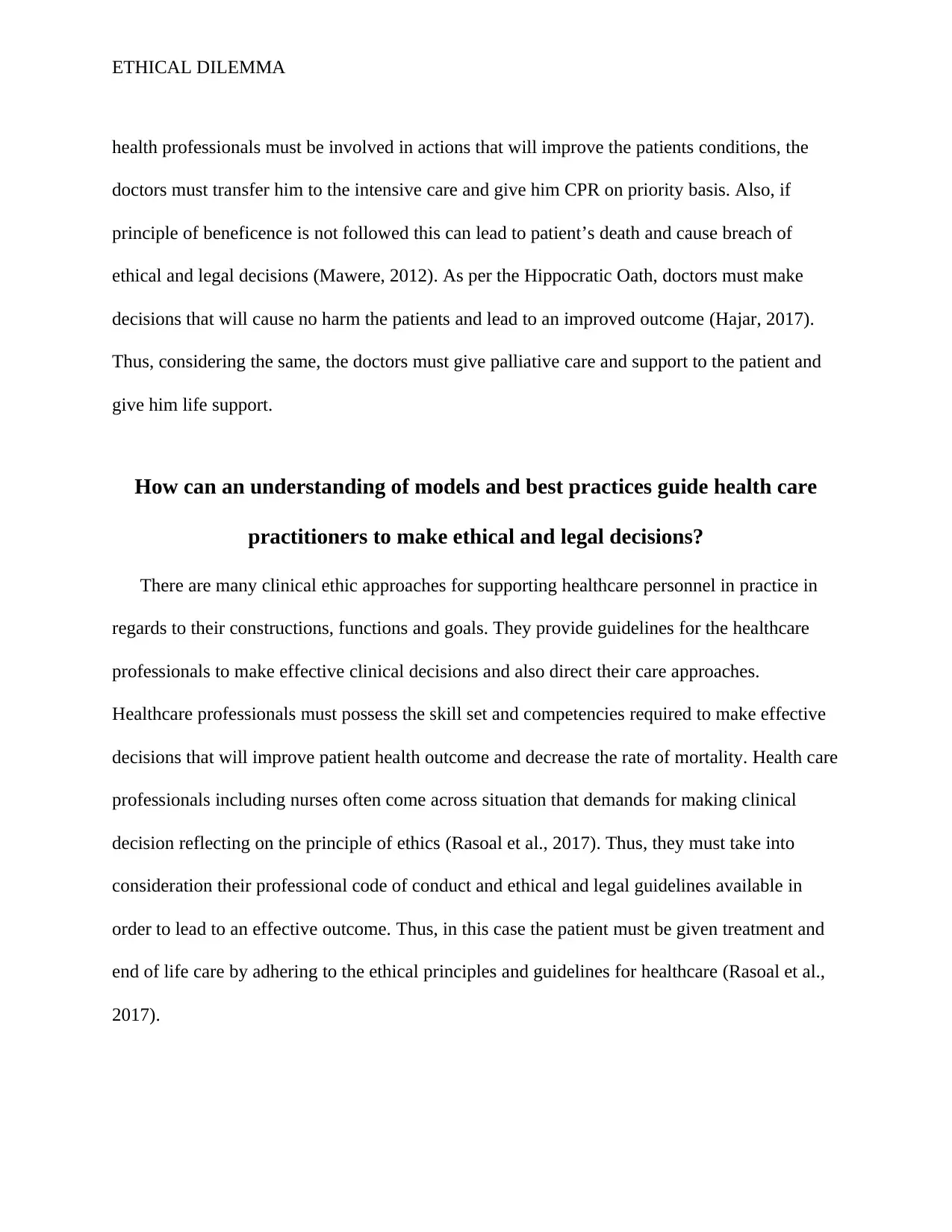
ETHICAL DILEMMA
health professionals must be involved in actions that will improve the patients conditions, the
doctors must transfer him to the intensive care and give him CPR on priority basis. Also, if
principle of beneficence is not followed this can lead to patient’s death and cause breach of
ethical and legal decisions (Mawere, 2012). As per the Hippocratic Oath, doctors must make
decisions that will cause no harm the patients and lead to an improved outcome (Hajar, 2017).
Thus, considering the same, the doctors must give palliative care and support to the patient and
give him life support.
How can an understanding of models and best practices guide health care
practitioners to make ethical and legal decisions?
There are many clinical ethic approaches for supporting healthcare personnel in practice in
regards to their constructions, functions and goals. They provide guidelines for the healthcare
professionals to make effective clinical decisions and also direct their care approaches.
Healthcare professionals must possess the skill set and competencies required to make effective
decisions that will improve patient health outcome and decrease the rate of mortality. Health care
professionals including nurses often come across situation that demands for making clinical
decision reflecting on the principle of ethics (Rasoal et al., 2017). Thus, they must take into
consideration their professional code of conduct and ethical and legal guidelines available in
order to lead to an effective outcome. Thus, in this case the patient must be given treatment and
end of life care by adhering to the ethical principles and guidelines for healthcare (Rasoal et al.,
2017).
health professionals must be involved in actions that will improve the patients conditions, the
doctors must transfer him to the intensive care and give him CPR on priority basis. Also, if
principle of beneficence is not followed this can lead to patient’s death and cause breach of
ethical and legal decisions (Mawere, 2012). As per the Hippocratic Oath, doctors must make
decisions that will cause no harm the patients and lead to an improved outcome (Hajar, 2017).
Thus, considering the same, the doctors must give palliative care and support to the patient and
give him life support.
How can an understanding of models and best practices guide health care
practitioners to make ethical and legal decisions?
There are many clinical ethic approaches for supporting healthcare personnel in practice in
regards to their constructions, functions and goals. They provide guidelines for the healthcare
professionals to make effective clinical decisions and also direct their care approaches.
Healthcare professionals must possess the skill set and competencies required to make effective
decisions that will improve patient health outcome and decrease the rate of mortality. Health care
professionals including nurses often come across situation that demands for making clinical
decision reflecting on the principle of ethics (Rasoal et al., 2017). Thus, they must take into
consideration their professional code of conduct and ethical and legal guidelines available in
order to lead to an effective outcome. Thus, in this case the patient must be given treatment and
end of life care by adhering to the ethical principles and guidelines for healthcare (Rasoal et al.,
2017).
Paraphrase This Document
Need a fresh take? Get an instant paraphrase of this document with our AI Paraphraser
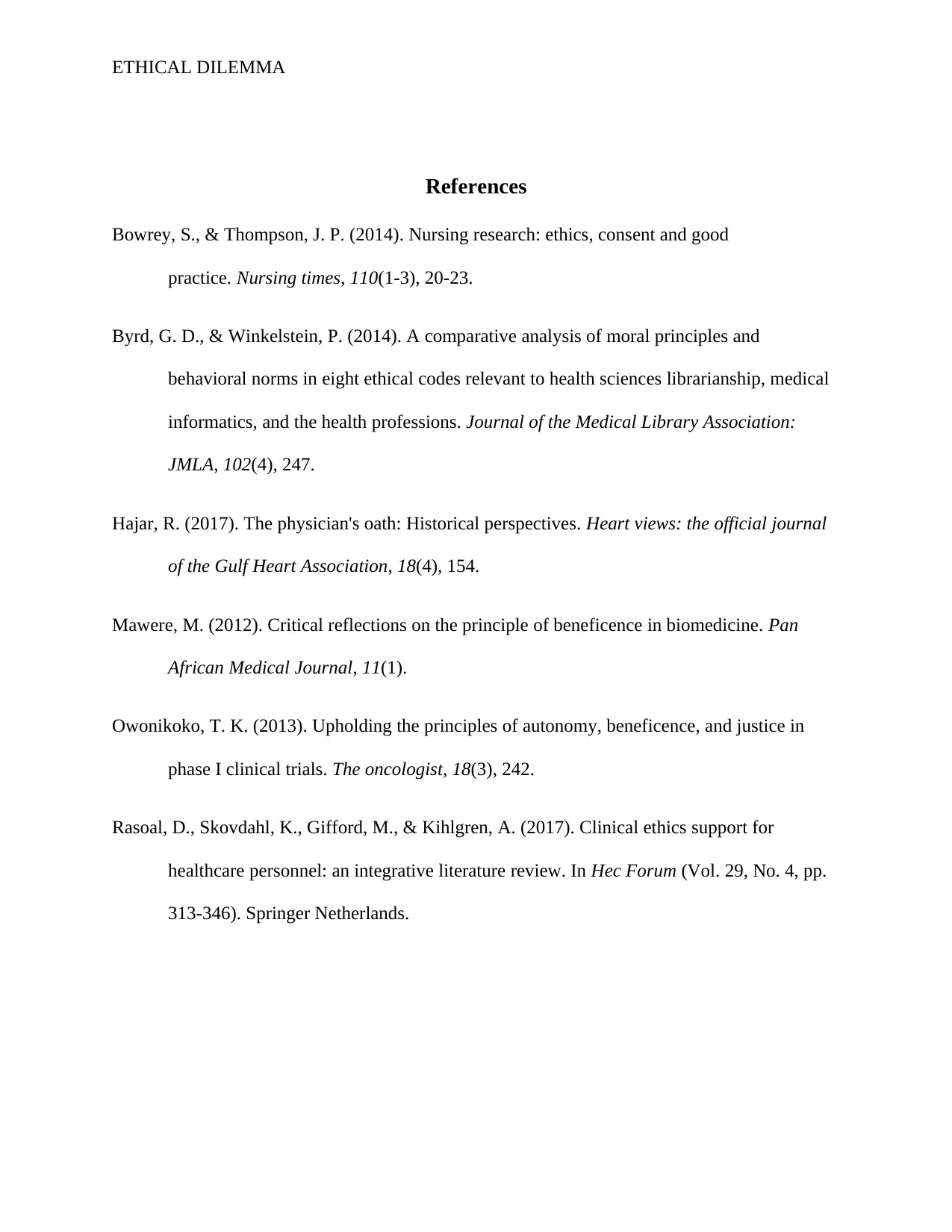
ETHICAL DILEMMA
References
Bowrey, S., & Thompson, J. P. (2014). Nursing research: ethics, consent and good
practice. Nursing times, 110(1-3), 20-23.
Byrd, G. D., & Winkelstein, P. (2014). A comparative analysis of moral principles and
behavioral norms in eight ethical codes relevant to health sciences librarianship, medical
informatics, and the health professions. Journal of the Medical Library Association:
JMLA, 102(4), 247.
Hajar, R. (2017). The physician's oath: Historical perspectives. Heart views: the official journal
of the Gulf Heart Association, 18(4), 154.
Mawere, M. (2012). Critical reflections on the principle of beneficence in biomedicine. Pan
African Medical Journal, 11(1).
Owonikoko, T. K. (2013). Upholding the principles of autonomy, beneficence, and justice in
phase I clinical trials. The oncologist, 18(3), 242.
Rasoal, D., Skovdahl, K., Gifford, M., & Kihlgren, A. (2017). Clinical ethics support for
healthcare personnel: an integrative literature review. In Hec Forum (Vol. 29, No. 4, pp.
313-346). Springer Netherlands.
References
Bowrey, S., & Thompson, J. P. (2014). Nursing research: ethics, consent and good
practice. Nursing times, 110(1-3), 20-23.
Byrd, G. D., & Winkelstein, P. (2014). A comparative analysis of moral principles and
behavioral norms in eight ethical codes relevant to health sciences librarianship, medical
informatics, and the health professions. Journal of the Medical Library Association:
JMLA, 102(4), 247.
Hajar, R. (2017). The physician's oath: Historical perspectives. Heart views: the official journal
of the Gulf Heart Association, 18(4), 154.
Mawere, M. (2012). Critical reflections on the principle of beneficence in biomedicine. Pan
African Medical Journal, 11(1).
Owonikoko, T. K. (2013). Upholding the principles of autonomy, beneficence, and justice in
phase I clinical trials. The oncologist, 18(3), 242.
Rasoal, D., Skovdahl, K., Gifford, M., & Kihlgren, A. (2017). Clinical ethics support for
healthcare personnel: an integrative literature review. In Hec Forum (Vol. 29, No. 4, pp.
313-346). Springer Netherlands.
1 out of 5
Related Documents
Your All-in-One AI-Powered Toolkit for Academic Success.
+13062052269
info@desklib.com
Available 24*7 on WhatsApp / Email
![[object Object]](/_next/static/media/star-bottom.7253800d.svg)
Unlock your academic potential
Copyright © 2020–2026 A2Z Services. All Rights Reserved. Developed and managed by ZUCOL.





